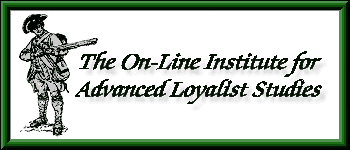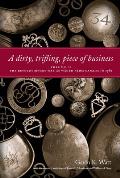

|
 |
|
This article on Loyalist families is presented in 8 parts. Click below to skip to:
Part 1 - Introduction |
Female Ancestors |
|
Widows and Orphans War has always been attended by death, and often those that die leave behind loved ones. Whether an officer or enlisted soldier, their death deeply affected those they left behind. However, there were differences in the way those dependents were treated after the loss. Widows of officers killed in action could expect a bounty of one year's pay, such as was awarded to Sarah BARNES after the death of her husband Major John, leading a charge of the Sixth Battalion, New Jersey Volunteers during Sullivan's Raid.37 Most officers' widows found life without their late husbands difficult in the extreme. Bureaucratic snafus frequently canceled allowances made to them and their former stations in life precluded any sort of labor on their part. Mary KEATING, widow of Captain Garret KEATING of the 1st Battalion, New Jersey Volunteers, was allowed "Billet rations and fuel" the last of which was stopped in August of 1781, thirteen months after her husband's death. Her commanding officer would only say of her that "She Behaved herself as a good woman."38 Margaret NEALON, widow of Captain James NEALON of the same battalion, wrote "had it not been for the Humanity of the Officers of the Battalion; must ere now been reduced to the greatest Want & Misery." Her major, Thomas MILLIDGE, added "her behaviour as a wife and since as a widow hath always been unexceptionable her Situation is truly deplorable."39 Extra hardship was heaped upon Elizabeth MARSH. Her husband, Henry, served as the captain lieutenant to the 4th Battalion, New Jersey Volunteers, prior to commissions being issued to the officers. He was killed in 1777 at the head of his company in Second River, M.J., leaving her totally unprovided for due to his not having been regularly commissioned. Add to that the claim against his estate by Major Daniel Isaac BROWNE of the battalion and the confiscation of their real property and slaves by the Rebels, and she was certainly "reduced to great want," not only for herself, but her three children. Her situation did not improve until she married Lieutenant Leonard REED, of the late King's American Regiment, in 1792. 40 While the problems of the officers' widows were basically that of financial freedom, those of the other ranks was as severe as not knowing where the next meal was coming from. As only wives of soldiers could receive rations, no provision was made for the widows and children. When the magazine at Pensacola blew up during the siege in 1781, it took a great many men of the Pennsylvania Loyalists with it, amongst whom was Sergeant FIELD. His widow quickly married Sergeant William GREER of the same unit, thereby continuing her and her child's rations.41 Elizabeth DOUGHERTY, wife of sergeant John DOUGHERTY of the 2nd Battalion, DeLancey's Brigade, was faced with a similar problem when her husband died of fatigue during the 1779 Siege of Savannah. She resolved her problem by marrying Private Edward McDONALD of the 71st Regiment of Foot, and leaving her native America for England after the war.42
37 Her bounty was computed at 365 days pay, at fifteen shillings per day, which amounted to 273.15. 0. "Account of Extraordinaries, paid pursuant to Final Warrants Granted by His Excellency Sir Henry Clinton K:B:....Between the 1st of July and 30th of September 1778." PRO, Treasury Office, Class 64, Volume 109, folios 53-61.
Click here for ---> Female Ancestors Main Page Refugees & Others: Loyalist Families
The On-Line Institute for Advanced Loyalist Studies Copyright Restrictions Document Formatting Optimal Viewing |
 by Angela Elwell HuntHardcover
by Angela Elwell HuntHardcover